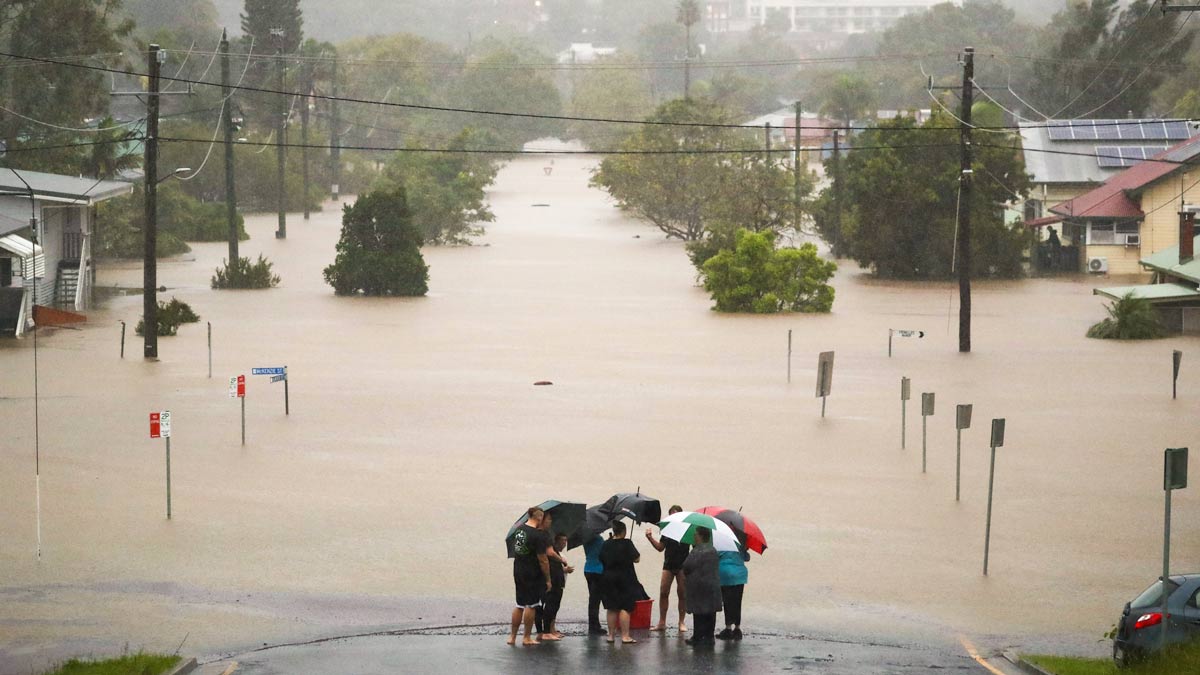

Flooding occurs in the town of Lismore, northeastern New South Wales, Monday, February 28, 2022. (AAP Image/Jason O'Brien)
The world faces a growing ecological and humanitarian crisis, as climate change drives increases in the frequency and intensity of “unavoidable” extreme weather events, including drought, floods, bushfires and sea-level rise, a new UN-backed report has detailed.
Published on Monday, the Intergovernmental Panel on Climate Change (IPCC) “Working Group II” report focuses on the impacts of rising temperatures on global ecosystems, the vulnerability of population centres and provides an assessment of necessary adaptation measures.
According to the authoritative report, is a growing urgency for countries to adapt and prepare for the impacts of an increasingly extreme climate, with even modest increases in global temperatures leading to potentially irreversible changes.
“This report is a dire warning about the consequences of inaction,” Chair of the IPCC Hoesung Lee said.
“It shows that climate change is a grave and mounting threat to our wellbeing and a healthy planet. Our actions today will shape how people adapt, and nature responds to increasing climate risks.”
The report forms part of an effort by thousands of experts and climate scientists to synthesise the latest and best understanding of climate science, providing an authoritative statement of the expected impacts of climate change.
The report warns of “unavoidable” and “multiple” climate change hazards over the next two decades as global warming approaches 1.5 degrees. The IPCC warns that exceeding this level of warming – as the world is on track to do – will lead to “additional severe impacts, some of which will be irreversible.”
“Global warming, reaching 1.5°C in the near-term, would cause unavoidable increases in multiple climate hazards and present multiple risks to ecosystems and humans,” the IPCC report says.
“Near-term actions that limit global warming to close to 1.5°C would substantially reduce projected losses and damages related to climate change in human systems and ecosystems, compared to higher warming levels, but cannot eliminate them all.”
The report found that the increased frequency and intensity of heatwaves, droughts and floods were already driving mass destruction of ecological systems that are being pushed beyond their tolerance levels.
“Widespread, pervasive impacts to ecosystems, people, settlements, and infrastructure have resulted from observed increases in the frequency and intensity of climate and weather extremes, including hot extremes on land and in the ocean, heavy precipitation events, drought and fire weather,” the report says.
“Approximately 3.3 to 3.6 billion people live in contexts that are highly vulnerable to climate change. A high proportion of species is vulnerable to climate change. Human and ecosystem vulnerability are interdependent. Current unsustainable development patterns are increasing exposure of ecosystems and people to climate hazards.”
The report found that climate change is already impacting global food and water security, undermining sustainable development and putting millions of people at risk of food and water insecurity.
This point is being driven home for Australians, with catastrophic flooding currently occurring across Southeast Queensland and northern New South Wales, which has destroyed homes and caused multiple deaths.
The IPCC called for urgent action to cut greenhouse gas emissions, which are contributing to accelerating global warming, to avoid “mounting loss of life, biodiversity and infrastructure.”
The IPCC also called for a massive ramping up of adaptation efforts, warning that current efforts are not keeping pace with the growing threat posed by climate change and vulnerable and low-income populations were not receiving the support needed to prepare for more extreme climate impacts.
“This report recognises the interdependence of climate, biodiversity and people and integrates natural, social and economic sciences more strongly than earlier IPCC assessments,” Hoesung Lee said.
“It emphasizes the urgency of immediate and more ambitious action to address climate risks. Half measures are no longer an option.”
Through the report, scientists have warned that the window for action to avoid the worst impacts of global warming is closing and that some parts of the world will not be able to develop the necessary levels of resilience to a changing climate should warming exceed 2 degrees.
“The scientific evidence is unequivocal: climate change is a threat to human wellbeing and the health of the planet. Any further delay in concerted global action will miss a brief and rapidly closing window to secure a liveable future,” IPCC Working Group II Co-Chair Hans-Otto Pörtner said.
The report emphasised the need for coordinated and ambitious action to limit the impacts of climate change and undertake effective adaptation measures, including contributions from both governments and the private sector.
“Our assessment clearly shows that tackling all these different challenges involves everyone – governments, the private sector, civil society – working together to prioritise risk reduction, as well as equity and justice, in decision-making and investment,” IPCC Working Group II Co-Chair Debra Roberts said.
“In this way, different interests, values and world views can be reconciled. By bringing together scientific and technological know-how as well as Indigenous and local knowledge, solutions will be more effective. Failure to achieve climate-resilient and sustainable development will result in a sub-optimal future for people and nature.”
The IPCC Working Group II group forms the second part of the IPCC’s authoritative Sixth Assessment Report, which will be completed this year.
The Working Group I report was released last year and quantified the expected temperature increases with rising greenhouse gas emissions. A third Working Group report, on potential climate change mitigation measures, will be released in March.
A Green Iron Investment Fund is exactly what Australia needs to lay the foundations for…
Australian Energy Market Commission is on the hunt for a new CEO, with current chief…
The deadline for the federal environment minister's decision on the contentious Hills of Gold wind…
Coalition's claimed nuclear cost savings are meaningless because they’ve failed to account for consumers spending…
An Australian company with a potential breakthrough in making a key battery storage ingredient lands…
Queensland's growing wind resource is setting new records for contribution to the grid – and offering…